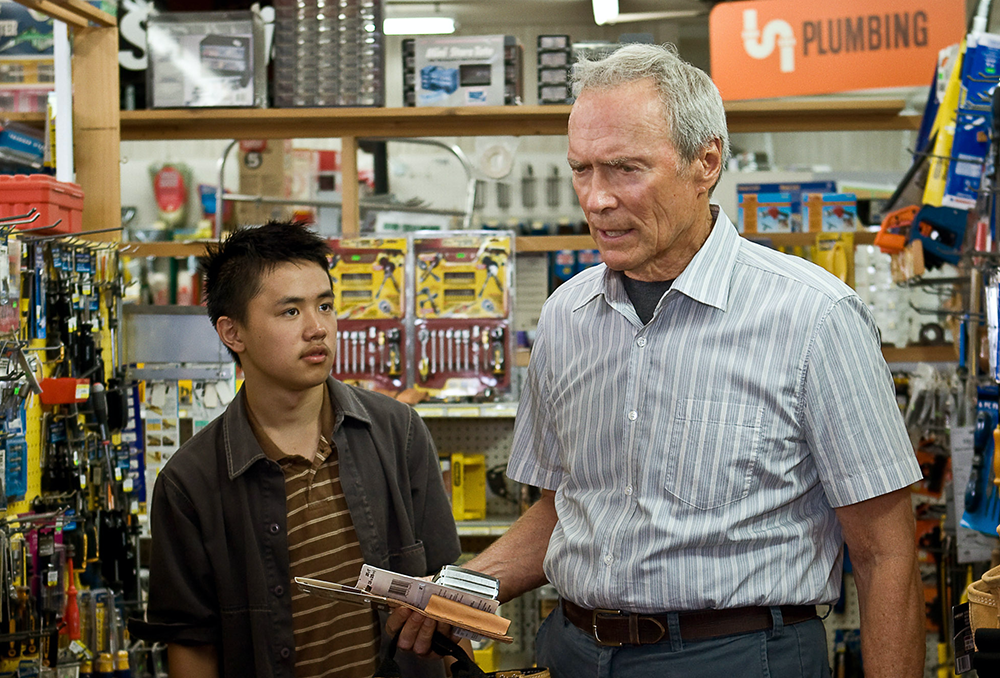At the opening of “Gran Torino” we see a stone-faced Walt Kowalski (Clint Eastwood) standing alone at the front of a church at his wife’s funeral. There’s no emotion in his eyes; he’s more concerned with his grandkids’ lack of proper mass attire than his wife’s passing. His demeanor continues to a reception at his house afterwards, where he scoffs at offers from his sons to help, while his granddaughter complains about the lack of service on her cell phone. A knock at the door, showing a young Hmong boy from next door inquiring if Walt has jumper cables solidifies his character: “Have some respect, zipperhead. We’re mourning here.”
“Gran Torino” is directed by Clint Eastwood in his first starring and directorial role since “Million Dollar Baby.” You’d be hard-pressed to believe at the film’s opening that by it’s conclusion you’d feel not only respect for Kowalski, but love, and that Eastwood would be able to take a practically irredeemable character and do just that. Of course, the whole effort is nuanced wonderfully, with performances, a script, a score, and a sharp focus that never wanes. ‘Dirty’ Harry Callahan may be Eastwood’s most iconic role… but Walt Kowalski may very well be his richest and best.
Kowalski is a Complex Character
The film succeeds in its stellar character development and the way it compares Walt’s typical American family with that of the Hmong family next door. Walt hurls epithets at whoever will listen, and even some that won’t. He wishes the ‘gook’ family from next-door would just up and leave. But we see the elder mother of the Hmong tribe utter similar wishes of Walt. “Gran Torino” is smart, and brings these worlds crashing together in an unlikely way. The young boy, Thao, tries to steal Walt’s prized 1972 Gran Torino for a forced gang initiation. When Walt throws the gang off his property, his rifle held at deadly aim, he inadvertently saves Thao’s life, setting in motion a course of events that shake the very fabric of his sheltered, racist existence.
The meat of “Gran Torino” lies in the chemistry between Kowalski, Thao (Bee Vang), and Thao’s sister, Sue, played by Ahney Her. It’s the small revelations that make it work; such as Sue recognizing that as old school as he is, Kowalski represents a different life to her than her traditional and über strict Hmong family. Kowalski learns too, in a series of events such as being brought a near endless supply of food for saving Thao’s life and a tour of a Hmong family gathering that leads to an odd revelation – he has more in common with these people than he does his own family.
Eastwood Makes His Arc Believable

Kowalski’s ensuing bond with Thao (whom he refers to as ‘Toad’) leads to some of the nicest scenes of the film, with the former showing Thao how to fix things around the house, clean his vintage car, and even how to act like a man and win a date with a beautiful Hmong girl from the neighborhood.
The acting and character development are all well done, with a majority of the film taking place at the hands of Thao, Sue, and Walt respectfully. Eastwood makes a smart decision and plays Kowalski close to the chest. One could imagine this character—bitter, jaded, and racist—falling apart in the hands of a lesser actor. Kowalski’s arc isn’t so much that he’s capable of change, but that he’s capable of love, and Eastwood makes us believe the transition.
In early conversations with a town priest (Christopher Carley) who urges Walt to go to confession, we see demons that he can’t let go. “The thing that haunts a man the most is what he isn’t ordered to do,” he recounts of his time spent in the Korean War. Walt doesn’t believe he can find absolution for these sins. But he does, in a scene that is shot perfectly, standing outside a battered apartment complex, in an emotional portrayal by Eastwood that defies his legend as a slick action hero. As a director, Eastwood spends so much time layering his character – and his bond with Thao—that the event, which won’t be hinted at here—exists as an end unto itself that closes the movie with perfect power and finality.
Choosing Love
But most of all, “Gran Torino” has it’s heart in the right place. This is not a film that celebrates prejudice, nor a film that offers family feuds as entertainment, but one that simply details real things that happened, things its characters regret, even if they can’t change them. The film is rife with symbolism and meaning, and Eastwood’s focus as a director and an actor have never been sharper. In the most unlikely way, you feel empathy for Walt Kowalski. The film’s opening presents him as emotionless, jaded, and cloaked in a cloud of prejudice. But somewhere along the line you understand him, see what he’s capable of, and, impossibly, start to like him. “Gran Torino’s greatest achievement is the seamless way that Eastwood brought you there.